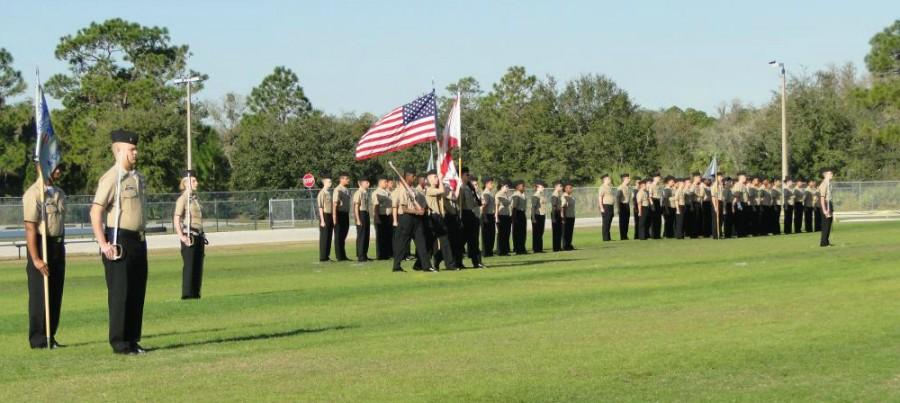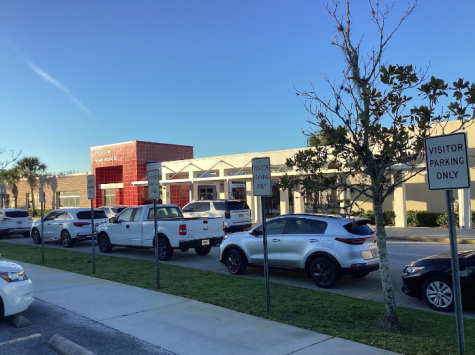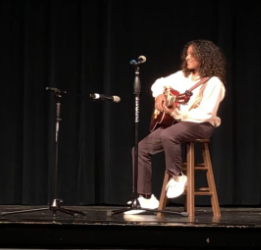Freedom’s Fighters
Walking the school campus on Wednesdays, one might find students sporting immaculate beige uniforms adorned with colorful ribbons denoting ranks and achievements. These students are part of the NJROTC (Navy Junior Reserve Officers Training Corps) program here on campus.
“ROTC does a lot of activities, such as community service, leadership training, and camping. We also have our own prom, called Military Ball,” said senior Ainesey Inguanzo. This year, the Military Ball will fall on April 2nd.
Joining the NJROTC program provides plenty of opportunities for community service.
“We go and clean up the highway or part of Bruce B. Downs, because we adopted part of that road. On Sundays, we go over to the hospital and help people get to their church services. We go over to the Veteran’s Hospital and help all the vet[eran]s. We do a dinner for them around once a month,” said senior Robert Lumadue.
There are also many other extracurricular activities to participate in.
“We have competitions, community service events, fun meets, and parades. You’ll see a platoon of us marching down MLK and 40th [for the Martin Luther King parade],” said sophomore Chris Miklaszewski.
Though the NJROTC students do learn about the US military and navy, there is absolutely no obligation to go into the service after high school. Though some students decide to do that, NJROTC is primarily a program dedicated to citizenship.
“It’s completely worry free. You’re not obligated to join the military. If you decide to join the military, then great, you pretty much get an extra rank to start with. And if you decide not to go into the military, you pretty much became a better citizen,” said Miklaszewski.
In a similar fashion to the military, students, or cadets, have ranks and promotions, and they earn awards and medals, proudly displayed on their uniforms.
Senior Delanzo Sharp, Cadet Master Chief Petty Officer, summarizes his job as “making sure everything’s going smoothly, making sure the job’s getting done, and that everyone’s doing what they’re supposed to be doing.” Regarding other students in the program, Sharp “make[s] sure all of [his] cadets are doing okay in school and make[s] sure they’re behaving.”
Though there is no commitment when joining NJROTC, the program gives students exposes to post-graduation career opportunities. Many universities also offer scholarships for NJROTC students.
Sharp, who plans to join the Marines after high school, said, “The instructors actually care about you. I’m glad I met them. If I hadn’t, I don’t know what I’d be doing after high school. They gave me a chance to improve my leadership skills, which I’m going to need in military life. They helped me get where I am now: my academics, my person as a whole.”
Freedom will soon be receiving another NJROTC instructor to work alongside Captain Theodore Wasylkiw and 1st Sergeant Eric Bowman.
“We were kicking cadets out. Just like the student-teacher ratio, there’s a cadet-instructor ratio. That means we can’t have so many cadets if we only have 2 instructors. We’re growing, so that’s why we’re getting another instructor,” explained Bowman.
To partake in the many activities offered to cadets, “everyone’s just expected to participate and be active in the unit,” said Sharp.
A major part of this is participating in drill competitions. Every few weeks, the cadets spend a Saturday competing against other schools in our division, Area 7. Students compete in a variety of categories.
“At drill competitions, we have armed drill and unarmed drill, and they have a regulation drill and an exhibition drill. Exhibition is more of a creative performance, while the regulation drill is something that everyone has to know and perform, uniform across all the different units,” said Miklaszewski. A drill routine is the series of coordinated movements, performed with or without rifles, usually by a small group of people.
Drill competitions also feature a PT (physical training) portion, which includes pushups, sit ups, and 100 and 200 yard races, a personnel inspection, and a 100 question academic test covering naval science and current events taken by all cadets.
For the academic tests, “everyone that competes with us has to learn a set amount of questions and a set amount of answers beforehand, such as the Navy’s birthday, ranks and rates, and the Navy and Marine Corps chain of command,” said Miklaszewski. These are typically taught in the required NJROTC class, Naval Science.
Regarding the competition in late January, Miklaszewski said, “When we came, it was around 40 degrees. It was breezing the entire time. When it was our time to do basic drill, it was raining sideways, it was extremely cold, but we made it through and surprisingly enough, we placed pretty high.” Freedom placed 4th overall and will attend the state competition, which is on March 5th.
In addition to the events at drill competitions, the Freedom NJROTC program also offers an orienteering unit, marksmanship, and color guard, which performs with flags and rifles at pep rallies and before football games.
Though there is an extensive amount of activities available to participate in, joining NJROTC still leaves students time for other interests.
“There are just so many opportunities. You can still run for track or you can do marching band, like I have been able to,” said Miklaszewski.
Among all the aspects of the program, many cadets will declare the other students the best part.
“[The best part is] the people. We really hold each other to a higher standard,” said Commanding Officer Lumadue.
To prospective ROTC cadets, Lumadue states, “I would encourage them to do it, even if it was just for the two years to get your HOPE credit. It’s really fun. You don’t just have to show up to the class and be bored; you can actually get involved and do stuff afterschool.”
Your donation will support the student journalists of Freedom High School - FL. Your contribution will allow us to purchase equipment and cover our annual website hosting costs.

Catherine is a senior at Freedom. This is her fourth year writing for the school paper. She loves to travel, pet dogs, watch the Office, and spend time...






